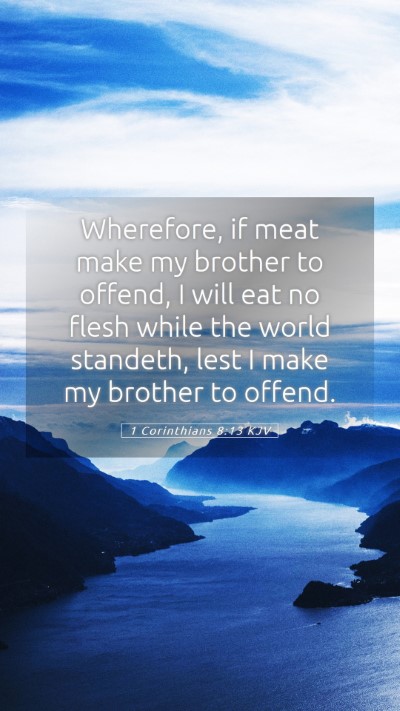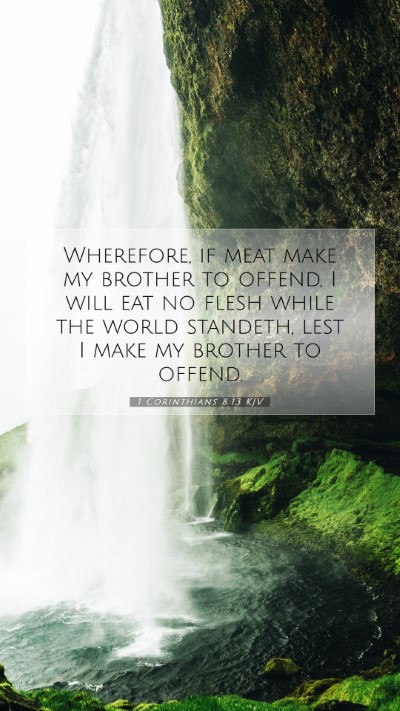Old Testament
Genesis Exodus Leviticus Numbers Deuteronomy Joshua Judges Ruth 1 Samuel 2 Samuel 1 Kings 2 Kings 1 Chronicles 2 Chronicles Ezra Nehemiah Esther Job Psalms Proverbs Ecclesiastes Song of Solomon Isaiah Jeremiah Lamentations Ezekiel Daniel Hosea Joel Amos Obadiah Jonah Micah Nahum Habakkuk Zephaniah Haggai Zechariah Malachi1 Corinthians 8:13 Meaning
What is the meaning of 1 Corinthians 8:13?
Wherefore, if meat make my brother to offend, I will eat no flesh while the world standeth, lest I make my brother to offend.
1 Corinthians 8:13 Bible Verse Meaning
Understanding 1 Corinthians 8:13
Bible Verse: 1 Corinthians 8:13 - "Therefore, if food makes my brother stumble, I will never eat meat, lest I make my brother stumble."
Overview of the Verse
This verse encapsulates the principle of love and consideration for others within the Christian community, emphasizing the importance of not causing others to falter in their faith through one's actions. In this context, the Apostle Paul addresses issues related to food offered to idols and the freedom Christians enjoy, balanced by the responsibility to protect the spiritual welfare of fellow believers.
Commentary Insights
-
Matthew Henry's Commentary:
Henry emphasizes the importance of charity and consideration for the spiritual development of fellow believers. He notes that the act of eating certain foods, while permissible, should never come at the expense of a weaker brother's conscience. The message urges believers to refrain from actions that may lead others away from faith or cause moral confusion.
-
Albert Barnes' Commentary:
Barnes elaborates on the social and ethical implications of Paul’s teaching, noting that true Christian liberty is expressed within the context of love. He argues that genuine love for others often requires a sacrifice of personal freedoms to ensure that others are not led into sin or temptation.
-
Adam Clarke's Commentary:
Clarke offers a historical perspective on dietary practices in the early church, elucidating how these customs could affect believers. He emphasizes that individual actions should be framed within a community perspective, aiming for unity and mutual edification rather than personal autonomy.
Key Themes and Principles
This verse brings forth several essential themes that are vital for understanding Scripture and applying its teachings in a practical way:
- Love and Responsibility: The call to love one's neighbor supersedes personal freedoms. Actions should be evaluated through the lens of their effect on others.
- The Weaker Brother: Paul highlights the need to be considerate of those who may not share the same level of understanding or faith, referring to them as the 'weaker' brother.
- Self-Denial for the Sake of Others: The verse underscores the idea that believers may need to deny themselves certain freedoms in order to promote the faith and well-being of others in the community.
Applying the Verse to Daily Life
In practical terms, 1 Corinthians 8:13 encourages believers to ask themselves how their choices affect the spiritual journey of those around them. Key questions to consider include:
- Are my actions building up or tearing down my community of faith?
- In what ways can I practice self-denial for the benefit of others?
- How can I foster an environment of support and encouragement in my Bible study groups?
Related Bible Cross References
- Romans 14:21 - Discusses the principle of not stumbling others by one's freedom.
- 1 Corinthians 10:31 - Illustrates how to glorify God in all actions.
- Galatians 5:13 - Emphasizes serving one another in love.
Conclusion
1 Corinthians 8:13 serves as a powerful reminder of the mutual responsibilities shared by believers in their walk of faith. The call to consider the impact of personal liberties encourages a spirit of unity and love within the body of Christ, guiding individuals in their actions as they pursue a deeper understanding of scripture and its application in everyday life.


